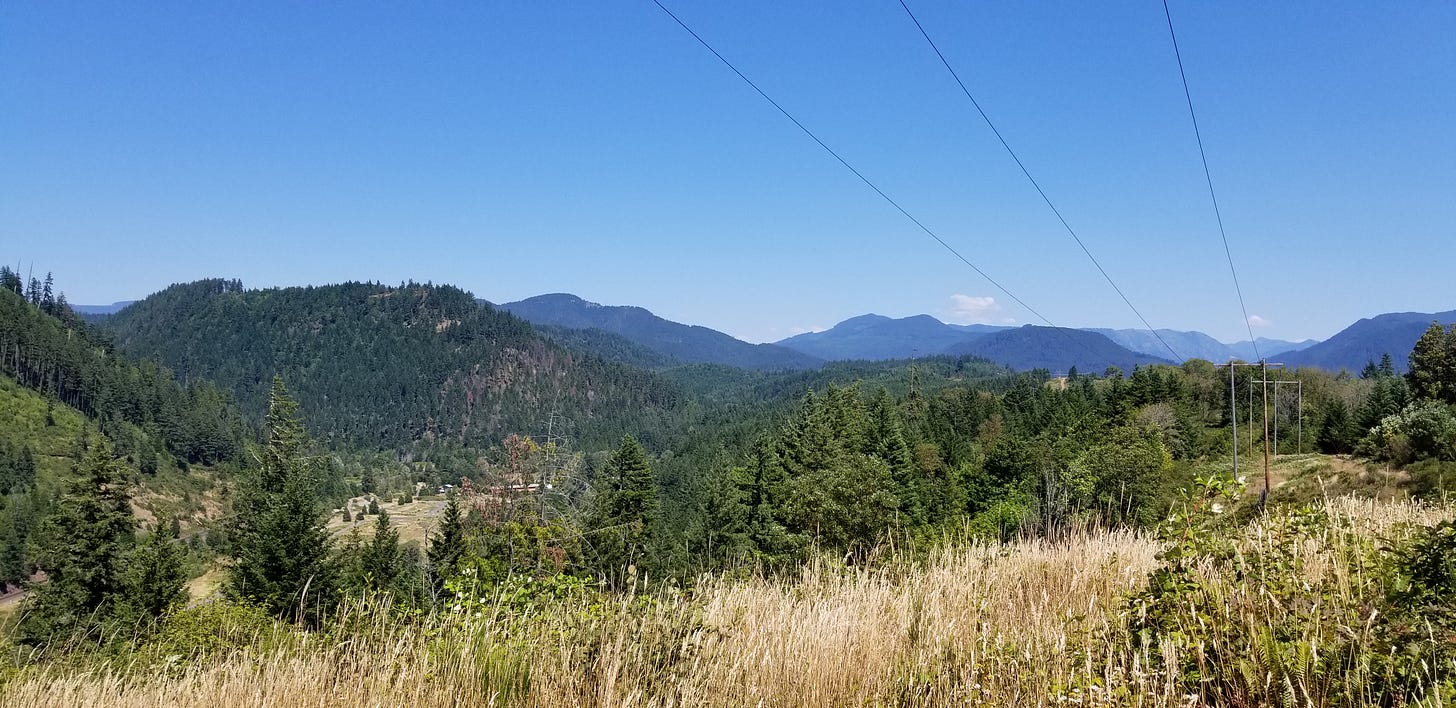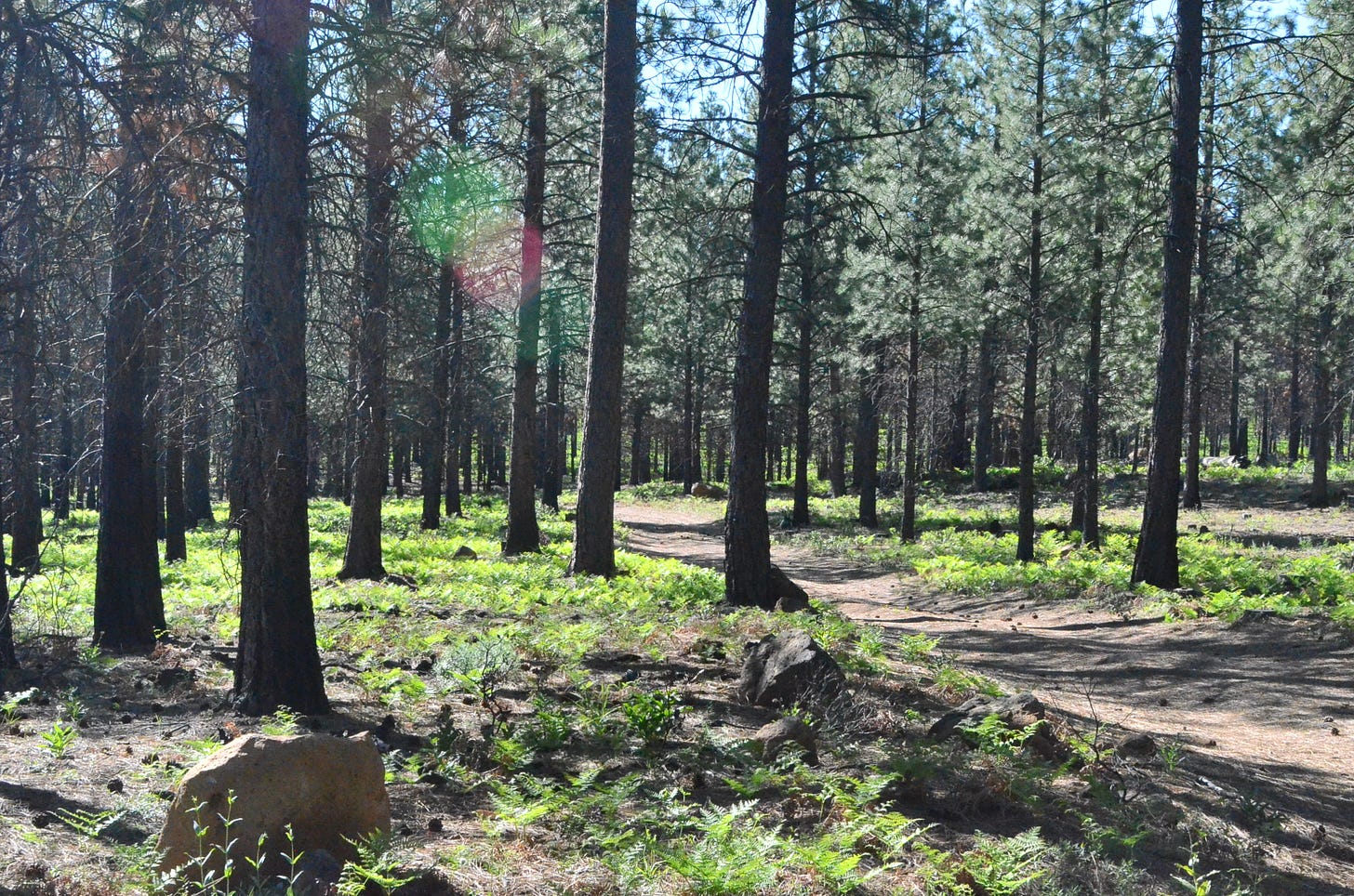HOME-NESS
The mountains call, and there's nothing I can do to resist. They are in my blood, part of my history, and more dear and remembered than my kin. The ashes of my father's side of the family are spread in the Wallowa-Witmans and the ashes of my youth in the Cascades. The mountains are where I would camp, contemplate, exercise, socialize, have sex, and threaten suicide; it's where life happened. I was unaware of the vast expanse of wilderness I was born within until it was no longer there. All my life, the wilderness was simply ordinary, as routine as my morning shit, and permeating life like the thoughts in my head. Today, however, it feels as distant as an old lover.
I'm unsure if this is a sign from my subconscious that it's time for me to move on from Chicago. It would be a sign that, even though I've found friendship and success here, at my core, I'm of and destined for the elevation and woods. However, it isn't a sign that It's time to go home, partially because that's impossible; home, if I ever had one, no longer exists. This is one of the reasons why I left Oregon in the first place. My un-security, though, is precisely that; some days I think I must leave, others I can't imagine leaving the city I love. This is why I'm going on the road for three weeks this September.
Home is a slippery concept that can deceive those who contemplate it. There are a few frames in which we can view home. 1) A place where one lives, eats, sleeps, and stores their things. 2) A state of mind in which one feels perfectly comfortable. 3) A place or area in which one has lived in the past which is of significance to them. Definition #1 is useless to discuss, as it is a utilitarian, tangible, and unemotional noun. #2 and #3, in contrast, are fascinating.
"Home is where the heart is" is a common phrase that summarizes the second definition of home. But we should question this saying because it implies one's heart may exist in places other than one's chest; how is this possible? The most common meaning of this phrase is that home is wherever one has the most loved ones, things, or positive emotions towards. The typical usage is close to the truth but is more of a mystical way of describing the first definition of home. Its literal meaning is more interesting; home is in the body, within oneself. There is a rare state of being when the interactions between one's internal and external worlds are just right, which causes one to feel like everything is perfect. This is the only other state of home-ness, besides the utilitarian noun, which exists. And it's what I'm describing in the second definition of home.
This second definition of home is mysterious. Everyone can remember moments when they felt like everything was just right, and some of us know the conditions they need to have that experience. But how does the external interaction with the internal cause this kind of inner bliss? Why is it different for many people? And what can this teach us about how we interact with our environments?
I miss the trees and elevation; I always will. It doesn't matter which trees or hills, whether in Vermont or San Diego, it all scratches the same itch. The itch which desires to be in that second state of home-ness. It's part of the formula which brings me to that experience of perfection. Somehow, that's where my heart is. More accurately, I find my heart in the forest, and I'm not the only one. Unbridled nature changes our frame of reference from within the pale of society to something beyond.
Untouched soil is both how society began and where it will eventually end. Society is simply one stage in a vast ouroboros of the earth becoming itself. Feeling consciously within that cycle gives me an incredible sense of well-being. While contemplating this cycle, I feel one with the landscape, and the unforgiving nature comes alive and begins breathing with me. It becomes easy to lose the boundary between me moving through the wilderness and the wilderness moving through me.
The third definition is what doesn't exist, it may exist in one's mind, but it has not and does not exist in reality. It doesn't exist because it's an abstraction, an amalgam of fact and fiction tainted by nostalgia and our faulty memory. This is how one can be misled by our own minds or heart, "for the heart is treacherous, who can know it?" Why does our mind remember "home" with such rose-tinted glasses? Is it just because it's a memory, and all memory is fickle like that?
"Going back home" is usually nothing short of a disappointment because of the disillusionment of the fond memories one has fabricated. Recently, I had the chance to visit a home I lived in as a high schooler. I could take the correct exit from the highway and all the right turns to get to the home, but when we drove past the house, I couldn't tell which one it was. Then we visited a park near the house, which I spent a lot of time in. Nothing came to mind; I had no recollection. It seemed familiar, but nothing I recalled was identifiable. I took a piss in some bushes, "nice view," I told my friend Ben. I didn't remember the view one bit. We went to my old high school afterward, and I experienced the same thing. "So, this is where it all happened," I thought as if I'd only read about it in a book. I realized what I felt as my old home was an invention and farcical; I couldn't wait to leave town.
I'm about to do it again and return to my home town. I'll remember it better since I lived there as an adult. But what I remember it feeling like will not correspond to my future experience. But alas, I'm homesick, and I need the illusion of a place I once lived shattered so I can continue living elsewhere in peace.
Whether I stay in Chicago or go, some part of me will be at home, another longing for home, yet one more will always be there, waiting for the right time to bubble into consciousness. Home, therefore, is difficult to grasp, especially for those seeking it. Isolating this second meaning of home and focusing on its cultivation will be helpful to those still seeking. Awareness of the other manifestations of home-ness will be beneficial in not being misled to conclusions rooted in pragmatism and nostalgia.
The second kind of home-ness is most important because it is the only of the three which most of us do not currently possess; it also brings us the most psychological well-being. Another way to view it is as the external conditions necessary for internal equilibrium. Or the place where one finds their soul gets in touch with their Self, or finds incredible peace. A place where everything for a moment feels perfect. But it is not only an external project; our internal landscape has to be receptive for the two realities to mesh. When the internal is not in the right state, it's often a problem of one's inner landscape being unable to settle into a state of conscious experience. In other words, the mind is too distracted by itself to be in the moment.
To return to this state of equilibrium as often as possible is an innate desire. When not in this state, one is either lacking something or over-abundant in another, which causes restlessness or lack of motivation, i.e., anxiety and depression. Being unequalized will push them to seek equilibrium, sometimes by any means necessary and other times harmfully (such as drugs, alcohol, and sex). There are other variables that I'm unaware of involved in this state of equilibrium, too, but that's a topic outside of the meaning of home.
Sometimes, whatever you do, the desire to "go home" becomes powerful; what to do about it? Try to relish and improve the other kinds of home experiences. If that doesn't work, the final solution is to return home. But be prepared, know that it will be a different place. It will be new and foreign because you will be new and foreign. No matter where you go, there you are, and there's nothing someplace can change about that.
As I prepare for my trip, I'm preparing to feel at home on every mountain but not within the city limits of my hometown. As I picture being there with increasing vividness, the town is not even where I want to be. I want, instead, to touch Black Butte, traverse Green Ridge, and watch the clouds collide with the Cascade Mountains. Those are the moments when I know I'll feel at home.







